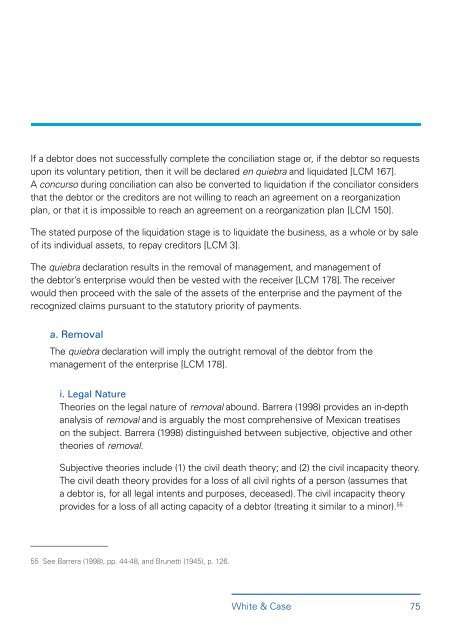Mexican Legal Framework of Business Insolvency - White & Case
Mexican Legal Framework of Business Insolvency - White & Case
Mexican Legal Framework of Business Insolvency - White & Case
You also want an ePaper? Increase the reach of your titles
YUMPU automatically turns print PDFs into web optimized ePapers that Google loves.
If a debtor does not successfully complete the conciliation stage or, if the debtor so requests<br />
upon its voluntary petition, then it will be declared en quiebra and liquidated [LCM 167].<br />
A concurso during conciliation can also be converted to liquidation if the conciliator considers<br />
that the debtor or the creditors are not willing to reach an agreement on a reorganization<br />
plan, or that it is impossible to reach an agreement on a reorganization plan [LCM 150].<br />
The stated purpose <strong>of</strong> the liquidation stage is to liquidate the business, as a whole or by sale<br />
<strong>of</strong> its individual assets, to repay creditors [LCM 3].<br />
The quiebra declaration results in the removal <strong>of</strong> management, and management <strong>of</strong><br />
the debtor’s enterprise would then be vested with the receiver [LCM 178]. The receiver<br />
would then proceed with the sale <strong>of</strong> the assets <strong>of</strong> the enterprise and the payment <strong>of</strong> the<br />
recognized claims pursuant to the statutory priority <strong>of</strong> payments.<br />
a. Removal<br />
The quiebra declaration will imply the outright removal <strong>of</strong> the debtor from the<br />
management <strong>of</strong> the enterprise [LCM 178].<br />
i. <strong>Legal</strong> Nature<br />
Theories on the legal nature <strong>of</strong> removal abound. Barrera (1998) provides an in-depth<br />
analysis <strong>of</strong> removal and is arguably the most comprehensive <strong>of</strong> <strong>Mexican</strong> treatises<br />
on the subject. Barrera (1998) distinguished between subjective, objective and other<br />
theories <strong>of</strong> removal.<br />
Subjective theories include (1) the civil death theory; and (2) the civil incapacity theory.<br />
The civil death theory provides for a loss <strong>of</strong> all civil rights <strong>of</strong> a person (assumes that<br />
a debtor is, for all legal intents and purposes, deceased). The civil incapacity theory<br />
provides for a loss <strong>of</strong> all acting capacity <strong>of</strong> a debtor (treating it similar to a minor). 55<br />
55<br />
See Barrera (1998), pp. 44-48, and Brunetti (1945), p. 126.<br />
<strong>White</strong> & <strong>Case</strong><br />
75
















